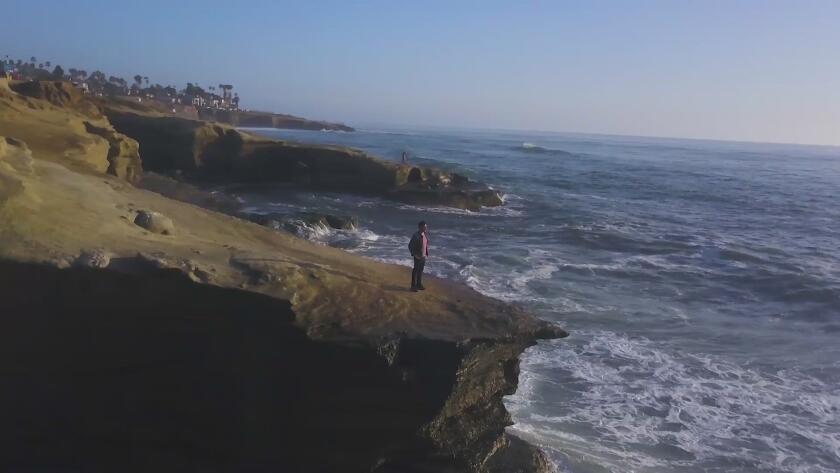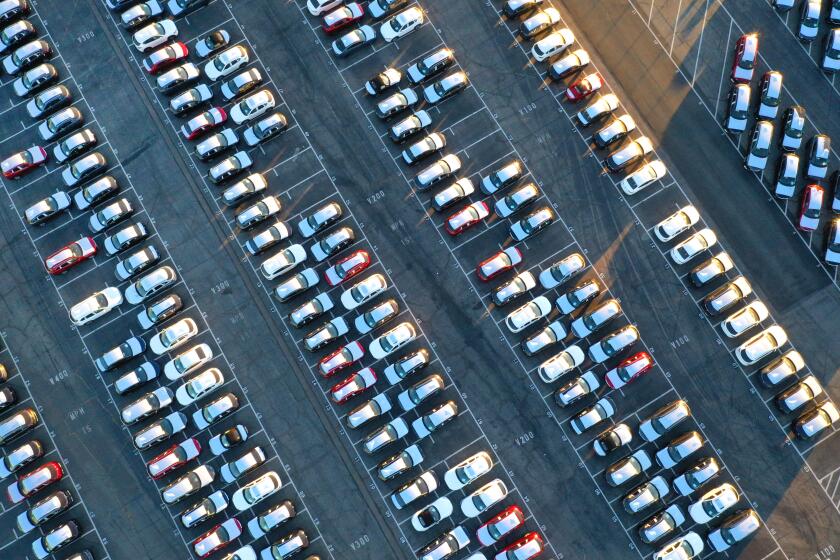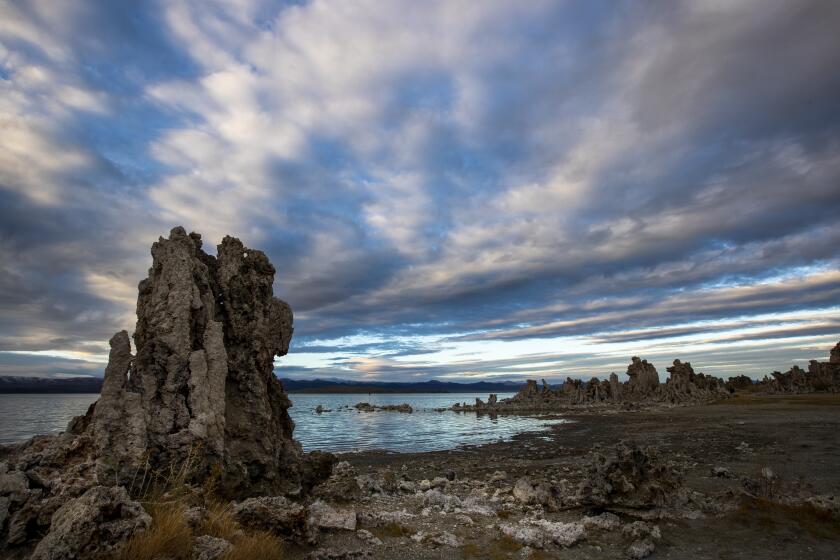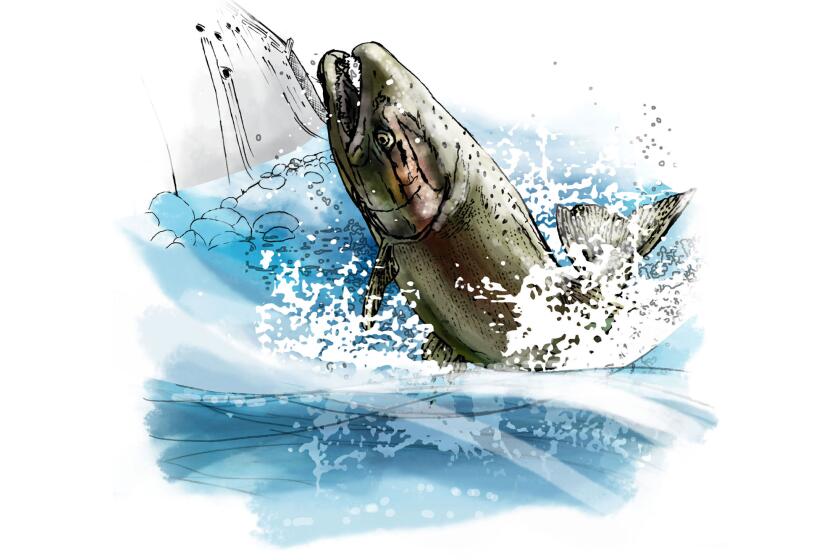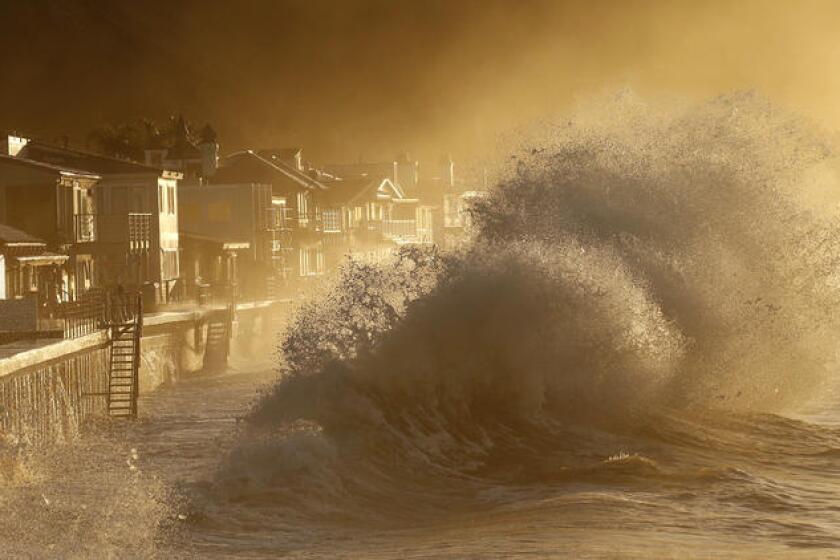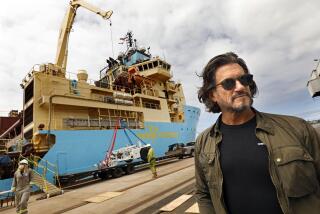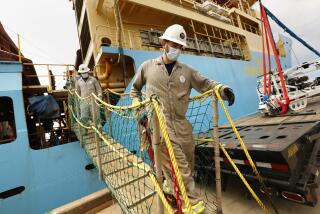A gold rush in the deep sea raises questions about the authority charged with protecting it
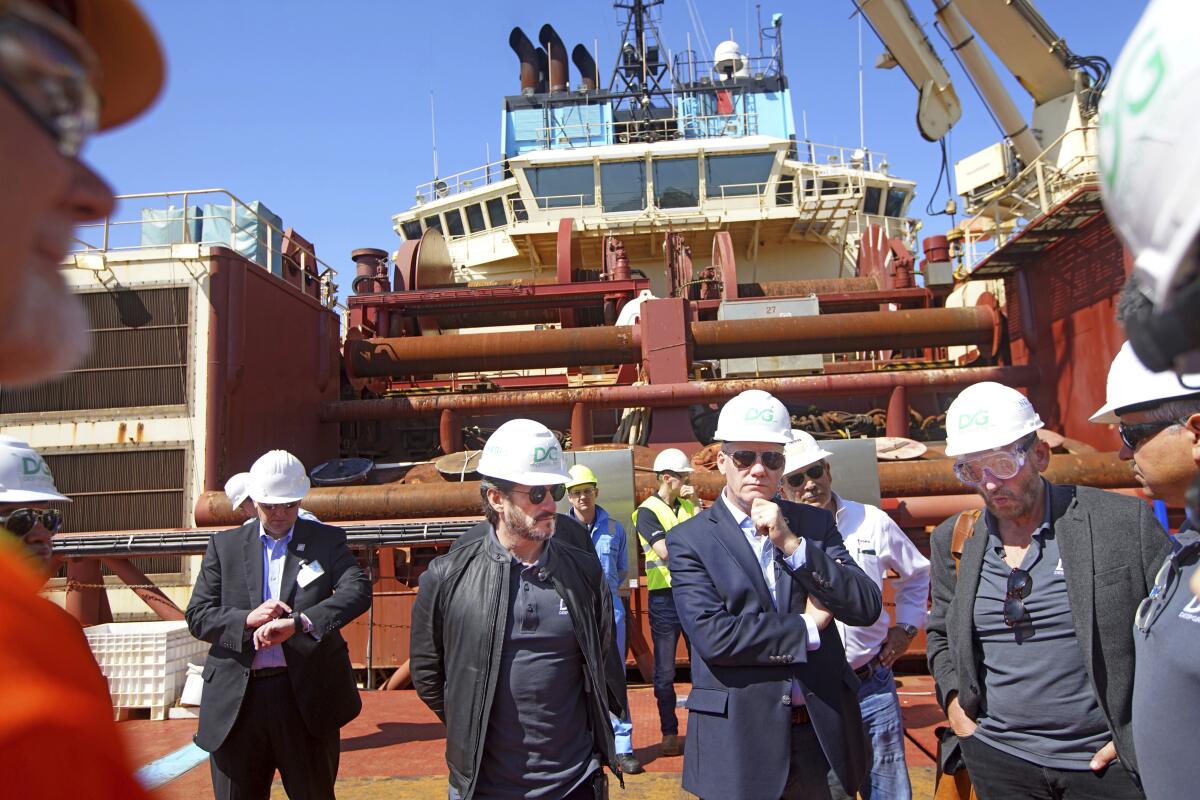
)
- Share via
The startup’s pitch was simple and cinematic:
The mining company would send large robots to explore the bottom of the ocean and harvest minerals, millions of years old, that could be used to make electric car batteries.
A promotional video showed a machine gliding over the seabed and DeepGreen Metals company executives in deep contemplation along a dramatic shoreline. A big selling point at a time the company was courting investors, though, was the man shown walking on a massive ship and speaking of the need to mine the ocean floor: the secretary-general of the International Seabed Authority, the United Nations-affiliated organization responsible for regulating ocean mining companies and preserving the deep sea.
Michael Lodge’s appearance in the video struck erstwhile members of his own staff — and scientists who warn of potentially catastrophic environmental fallout from the mining venture — as problematic. It raised concerns, they said, of a conflict of interest between industry, the authority and its secretariat, the 47-person administrative arm Lodge leads, at a crucial moment for the world’s oceans.
- Share via
In this promotional video from DeepGreen Metals, Michael Lodge, secretary-general of International Seabed Authority, asserts support for the firm’s mission and says his organization has greenlighted a 15-year exploration contract. The video for the firm now known as The Metals Co. was posted online in 2018 but recently removed from public view on its Vimeo site.
“Land-based resources are becoming increasingly difficult to access. We have taken the best resources already,” Lodge said in the 2018 video, as he peered at the computer screens on the DeepGreen vessel. He went on to let viewers know that his agency was on board with the company’s quest, having greenlighted a 15-year “exploration” contract.
As Lodge’s organization works to draft regulations that will allow robots to mine the seabed on an industrial scale, internal documents reviewed by The Times point to a closeness with mining companies that stands out as unorthodox in environmental regulation.
“The ISA is not fit to regulate any activity in international waters,” said Sandor Mulsow, a marine geologist who served as the authority’s top environmental official for more than five years, until 2019. “It is like to ask the wolf to take care of the sheep.”
The authority, which was established by a U.N. treaty but operates autonomously, is pushing to set up rules that could allow seabed mining in as few as two years, despite calls from scientists and even some car companies for more research into the little-known ecosystems and the scale of damage that excavating the ocean floor could cause. A vast stretch of the Pacific between Hawaii and Mexico is set to be mined first, and Southern California ports would probably be a major base for mining operations.
This new frontier of the electric car supply chain operates by its own rules. Much of the International Seabed Authority’s key work is conducted out of sight from its members: 167 nations and the European Union. Australia, Mexico, Chile, Britain and at least five other member states have expressed concern that the authority isn’t requiring mining contractors to do enough environmental assessment. The organization is accused by some nongovernmental organizations and some of its own former employees of being too accommodating to the companies it regulates.
Its budget is small, at less than $10 million, but auditors and key ISA staff have raised concerns over the authority’s financial controls. The staff is dispirited to the point that a management consultant in 2018 summarized the ISA in an internal email as “an unpleasant (and often toxic) place to be.” The consultant returned in 2019 to report that morale had dropped further.
The International Seabed Authority, through a lawyer, disputed the findings of The Times’ investigation. It said the authority “consists of motivated, highly committed experts from more than 20 countries, working hard to fulfill the important mandate with which it has been entrusted.”
Asked about the promotional video that features Lodge, the ISA said he regularly interacts with stakeholders, including member states and contractors, and visits sites such as research vessels, adding that “interactions reflect the proper and professional continuance” of the authority’s mission. “The ISA had little control over the use of the images captured by third parties.”
Lodge has publicly accused critics of the authority of misconstruing its work and overstating the potential impacts of mining. At a conference in June, he talked of “a growing environmental absolutism and dogmatism bordering on fanaticism.”
In the name of climate action, California pushed the world toward electric cars. But building enough of them is creating its own environmental crises.
Earlier, he had dismissed concerns raised by scientists and nonprofits, telling the publication Economist Impact that the consequences of mining are “predictable and manageable.”
“If you said that no industry can start until we know what is going to happen from that industry, then that’s an entirely circular argument that would prevent any industry in the history of humanity from starting,” Lodge said in the late 2019 interview.
When Radio New Zealand in 2020 referred to Lodge as a “cheerleader” for mining interests, he threatened a defamation lawsuit, according to a letter sent to the news organization by an Australian law firm representing the secretary-general. Radio New Zealand subsequently removed the reference to Lodge in a news story.
Electric vehicles start seabed gold rush
The International Seabed Authority operated in relative obscurity for years from its harborside headquarters in Kingston, Jamaica. The U.N. Convention on the Law of the Sea established the authority in 1994 to ensure the “equitable exploitation” of the seabed in international waters, which it declared “the common heritage of mankind.”
Now, a California-led push for electric vehicles has brought the body more attention, as automakers scramble to find the cobalt, nickel and other minerals crucial to making the batteries that power the vehicles. The International Energy Agency projects that demand for the materials could soar 600% over the next two decades.
That has some deep-pocketed companies and investors looking toward the sea.
They are invoking the urgency of climate action and harm caused by gas- and diesel-powered vehicles in their push to vacuum the seabed for ancient, mineral-rich nodules. Mining contractors, which include government-owned enterprises and agencies, must be sponsored by a member state and would pay royalties to the authority once extraction begins. At present they are permitted only to engage in research expeditions aimed at gauging the viability and environmental impact of mining. But rules being fast-tracked by the ISA would allow for large-scale excavation.
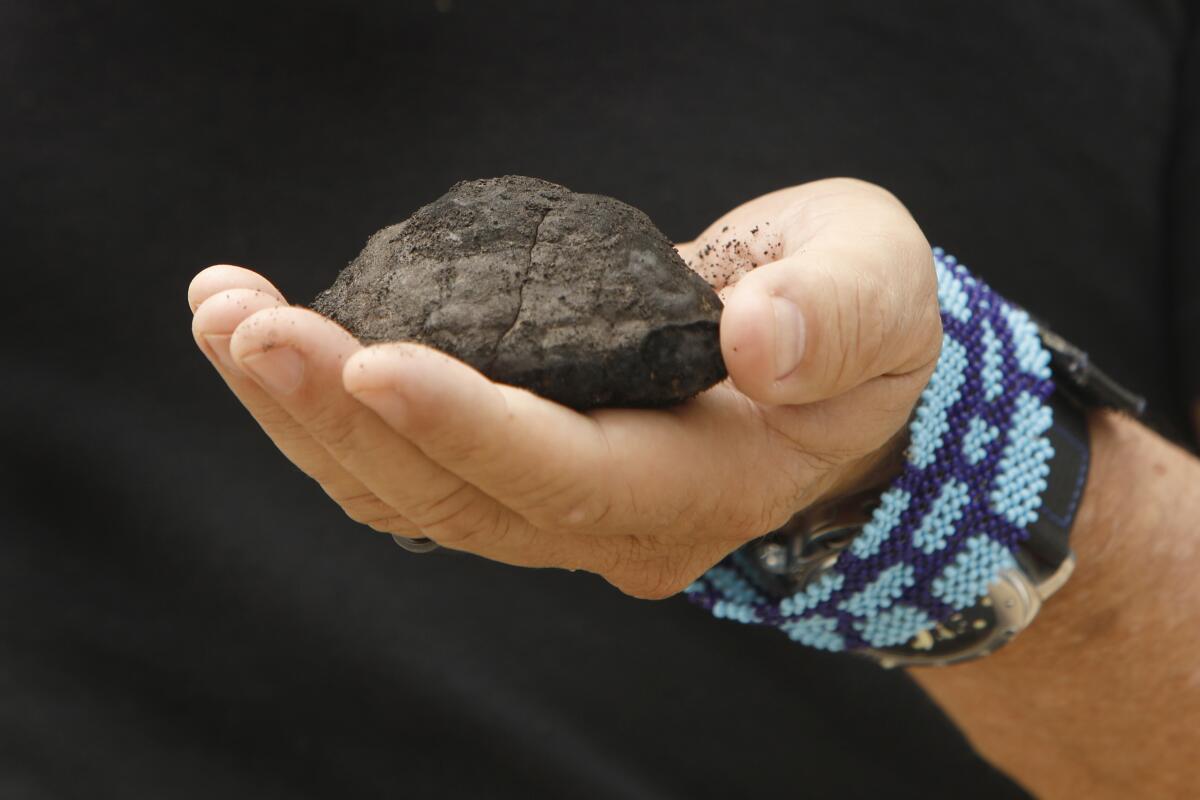
The push comes at the behest of companies like DeepGreen (now called the Metals Co., after a 2021 merger), which have been lobbying the authority to finalize regulations so the mining of minerals potentially worth trillions of dollars can begin.
The Canadian-registered company said in a statement that the environmental impact of its mining operations would be dramatically lower than those of land-based mining, and it contends that “massive volumes of data” have been collected in research on that impact over “more than five decades.”
“Despite entreaties to engage with us on the science which shows that nodules are a better source of metals for the planet, anti-[deep sea mining] groups choose to ignore the data and proceed to promote the myth that we can fight climate change and achieve global decarbonization by recycling and consuming less,” its statement said.
Mining firms have found an ally in Lodge, a 62-year-old British lawyer first elected as secretary-general in 2016 after serving at the ISA since it began operations, according to former authority staffers, activists and scientists.
“I am disturbed by the fact that popular perception of deep seabed mining is increasingly subject to wildly inaccurate and distorted scenarios portrayed by some sections of the media and interest groups,” Lodge said in a 2018 speech to a business group in Hamburg, Germany. “Suggestions that deep seabed mining will inevitably cause large-scale irreversible damage and ecosystem collapse appear to be grossly exaggerated and lack any basis in fact.”
At the same time the authority is writing the rules for this deep-sea gold rush, it is looking to join it. The authority’s charter calls for it to create a seabed mining company called the Enterprise. The stated goal is to help cash-strapped developing nations share in the profits and technology from mining operations. But there is deep unease among some member countries and observers who see an intrinsic conflict of interest.
“It’s extremely concerning” that the ISA “would be in charge of running a business that it is also in charge of regulating,” said Arlo Hemphill, a senior oceans campaigner for Greenpeace.
The authority, through its attorney, said that there is no conflict within the mandate of the ISA and that it is charged with “regulation of seabed activities in the context of the aim of protecting the marine environment.”
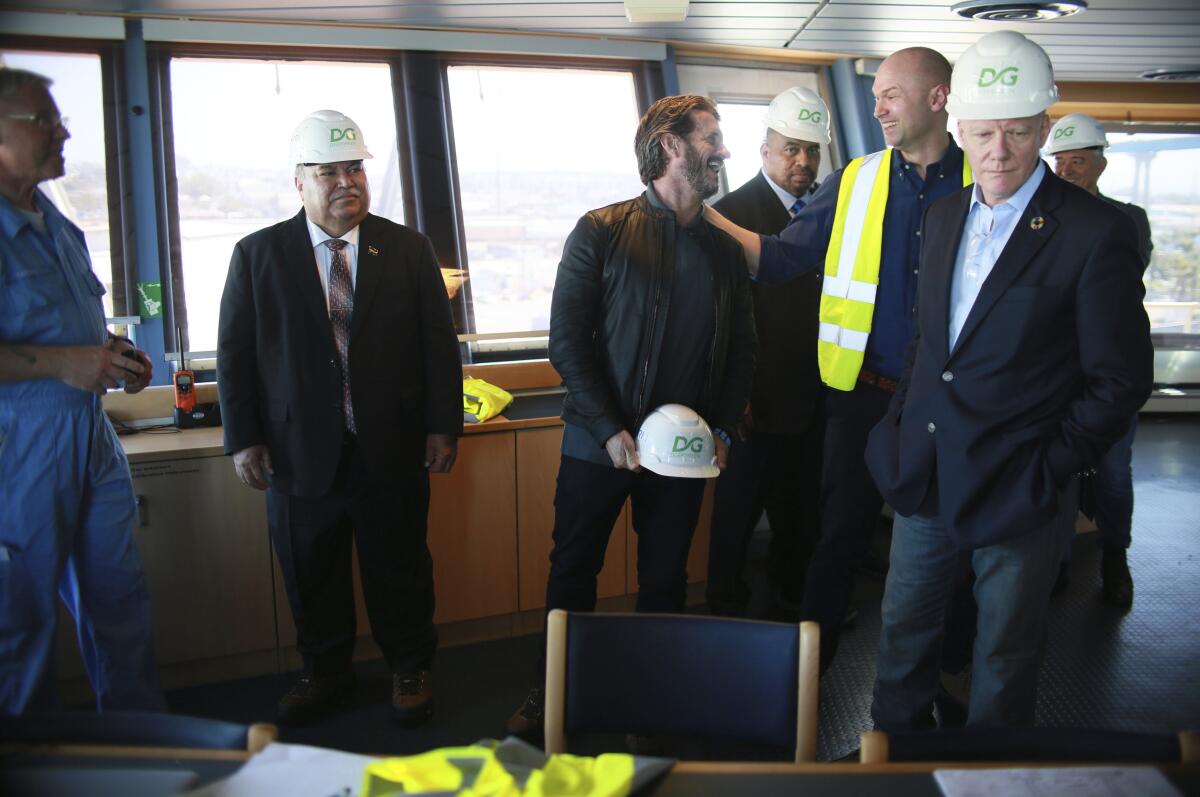
The authority said through the attorney that the Enterprise will be “separate from the ISA, supervised by an elected Governing Board and administered by an elected Director-General.” An interim director-general will be appointed by the ISA’s secretary-general. Until it is operational, the ISA secretariat will carry out some “functions which mainly relate to the preparation of studies and assessments” consistent with the U.N. Convention on the Law of the Sea, the attorney’s letter said, adding that there is no conflict.
That U.N. convention states the Enterprise will be an “organ of the Authority.” The board and director-general of the Enterprise will be elected to fixed terms by the full ISA Assembly based on a recommendation by the smaller ISA Council. The Enterprise will have its “principal place of business at the seat of the Authority” and will have “autonomy in the conduct of its operations” but must present project proposals to and “be subject to the directives and control of the [ISA] Council.”
The Enterprise is essentially a potential multibillion-dollar mining company that could provide revenue for impoverished nations and bring the seabed authority hundreds of millions of dollars in royalties.
Little-known undersea ecosystems
Scientists have called for a pause in the move to mine the seabed. A petition signed by 622 scientists and marine policy experts from more than 44 nations warns that there are too many unknowns. BMW, Volvo, Volkswagen and Google are all pledging — for now, at least — not to use metals mined from the deep ocean floor. In February, California legislators introduced a bill to ban seabed mining in state waters.
Scientists are just starting to unravel the role these ecosystems play in the global carbon cycle and climate change. Life that evolved under the crushing pressure and frigid darkness of this targeted seabed more than two miles underwater tends to live long, reproduce slowly and be found nowhere else. With each expedition to the abyss come astonishing discoveries — ghost octopuses,gummy squirrels and evidence that whales dive miles to the ocean floor. Even so, researchers say they have identified only a few strands of this otherworldly web of life.
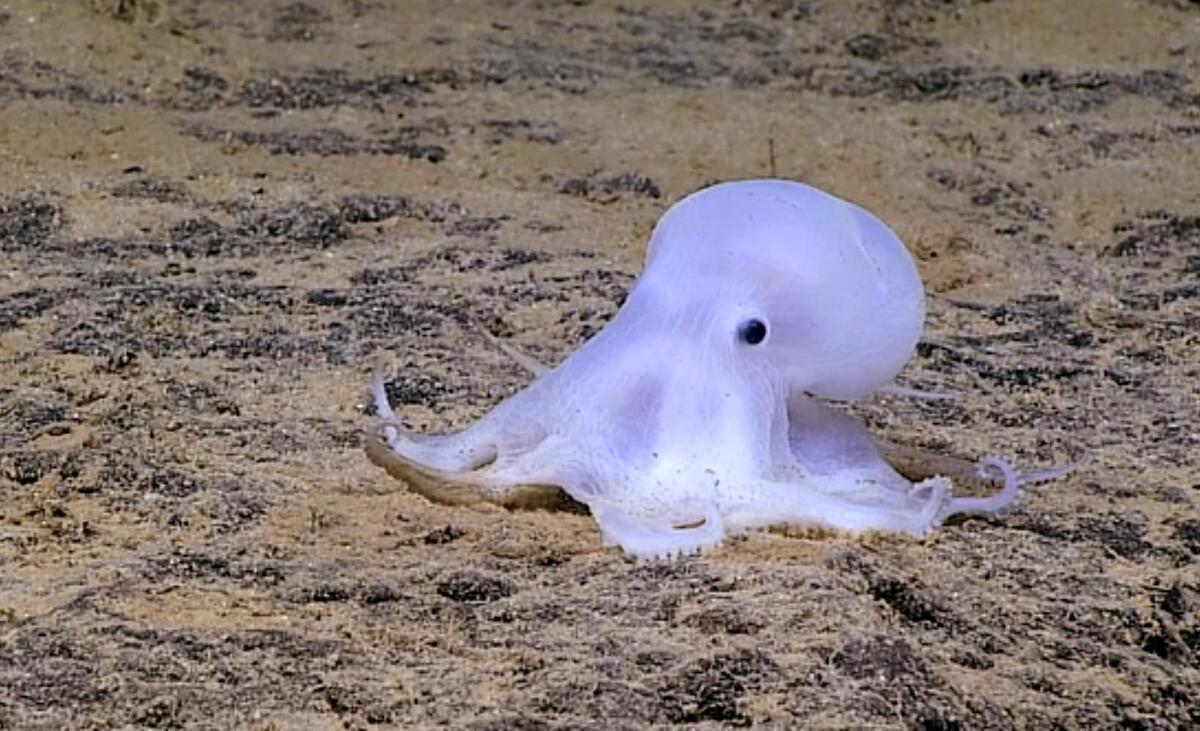
Mining threatens habitats unlikely to recover on human time scales, oceanographers say. Plumes of sediment kicked up from mining could suffocate organisms miles away; toxic metals and mining waste could be released into the water column that connects the deep ocean to the surface and is a two-way highway for marine life on which humans depend, scientists say.
“There is no place on Earth that we know less about, and it is responsible for keeping the planet habitable and contributing to our well-being and our livelihoods,” said Diva Amon, a research scientist at UC Santa Barbara who studies the deep ocean marked for mining. Amon has participated in ISA proceedings and in 2018 received a research award from the secretary-general.
“Given how this would be impacting one of the biggest ecosystems on the planet, we need to do a lot more research,” said Douglas McCauley, a marine science professor at UC Santa Barbara. “This is the space on the planet where we know least about what species are down there and how they function. There would be a lot of impacts we are aware of, and a lot we are not yet aware of.”
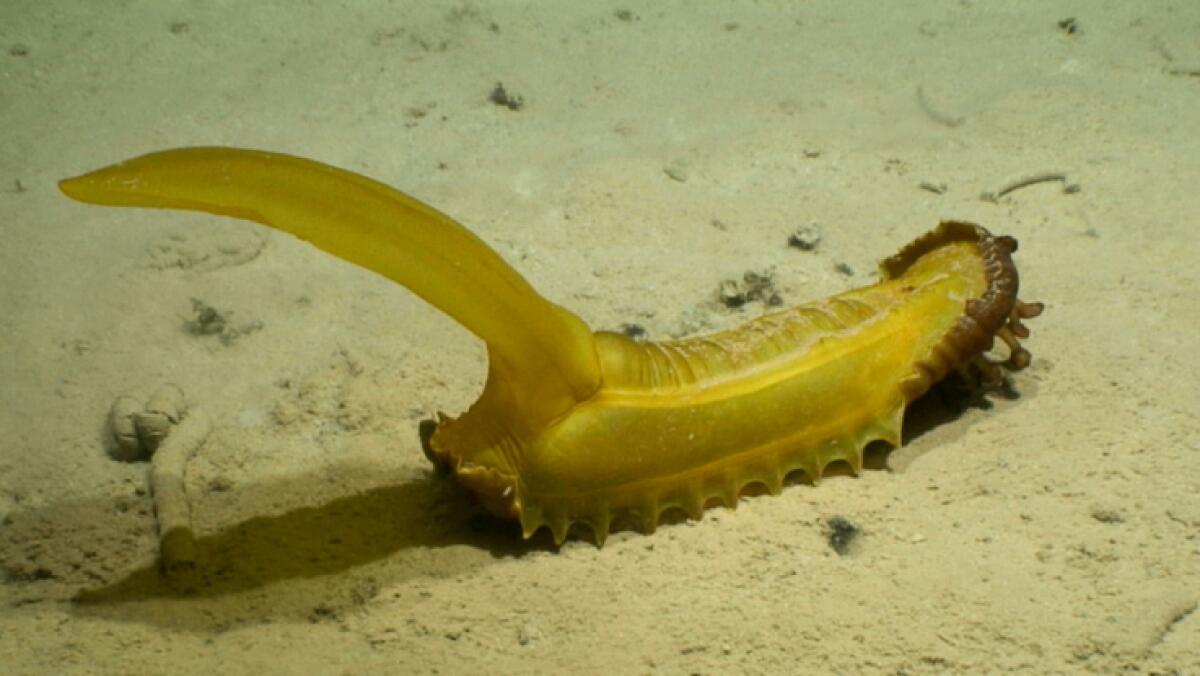
Some scientists say the authority does not push mining companies to collect sufficient environmental data to effectively weigh the risks of industrial-scale seabed mining.
“The current secretariat is very much in favor of deep seabed mining, and it’s no secret that it perceived that environmental conservation would be more hindering than helping mining,” said Stefan Bräger, a marine biologist who served as the authority’s scientific affairs officer for five years until late 2018.
In public and private comments, Lodge has disputed many of the concerns raised by scientists. After Mulsow and Bräger published a paper in September 2018 that highlighted the authority’s “lack of enforcement of environmental regulations,” Lodge moved to discredit their findings.
“The paper was published without any authorization, and I actually don’t accept any conclusions of that paper,” Lodge told a Times reporter in 2019. “I think it’s based on misconception of what the actual requirements were for contractors in collecting data.
“The only requirement,” Lodge added, “is that you have to submit an environmental impact assessment. Whether that’s based on two years of data or 30 years of data, it doesn’t matter.”
Sounding an alarm
Mulsow and Bräger were not alone in sounding an alarm. Representatives from some of the authority’s member states have repeatedly raised issues about its approach to protecting the seabed.
“As has been brought up year after year, not enough baseline data is available, and not enough will be available before the start of exploitation,” Italy’s representative to the ISA said at its July 2019 meeting, after delegates were again told that mining contractors whose names were not disclosed had not reported required environmental data. “There’s an urgent need for more data.’’ Australia’s delegate said, “Noncompliance is particularly concerning as we move closer to the exploitation phase.”
The water level at Mono Lake has fallen to a key threshold, prompting cuts in water exports by the Los Angeles Department of Water and Power.
Lodge had earlier assured mining interests that he was not necessarily worried about how they conduct their research.
“I want to emphasize that I, personally, do not have major concerns about the performance of contractors,” he told mining executives at a private meeting in 2018 in Warsaw, according to a transcript reviewed by The Times.
A team of 31 deep-sea scientists and experts, including four members of the ISA’s mining regulations committee, recently conducted an exhaustive review of all available research and concluded that there are inadequate scientific data to properly manage mining.
Published in the April issue of Marine Policy, their peer-reviewed paper, with Amon as lead author, found that there was “no or next to no scientific knowledge” and “scientific knowledge gaps” for most of the seabed targeted for mining. The knowledge that does exist is too limited to currently enable appropriate regulation of mining, the authors said.
Some member states have reached the same conclusion.
“The current state of knowledge about the deep sea is insufficient to permit a move to the exploitation stage,” Germany’s delegate told the council March 21, as it met in Kingston to negotiate mining regulations in person for the first time since the COVID-19 pandemic began.
Little oversight from the U.N.
Although the ISA is associated with the United Nations, the U.N. exercises little oversight of the authority or its secretary-general. The ISA Council is the authority’s policymaking body, comprising 36 member nations. The United States, which has not ratified the Law of the Sea treaty, is not among them, although it participates as an observer. The council elects a smaller group of experts — including lawyers, scientists and mining specialists — to review mining applications, write regulations and track environmental compliance.
Most of the work of that smaller group, called the Legal and Technical Commission, happens behind closed doors. And even that group is not apprised of key details of contracts, which the secretary-general personally negotiates with the mining contractors.
At the council meeting March 30, Chile’s delegate objected to the Legal and Technical Commission’s refusal to identify the owners of a mining company that has applied for an exploration contract sponsored by Tuvalu, a South Pacific nation with a population of 11,000. The chair of the commission would say only that the applicant is a subsidiary of a Canadian-registered company.
“I’m quite concerned,” said the delegate. “Chile believes there must be transparency in regard to the contractors.”
(Tuvalu’s foreign minister this month said his government had rescinded the sponsorship approved by the previous administration, citing concern over “the environmental impacts of seabed mining.”)
It is under this system that the identity of mining contractors who do not report required environmental data stay hidden even from the authority’s member nations. Several complain that the lack of disclosure means the organization wouldn’t be able to stop scofflaws from winning permission to excavate the seabed.
“We find it concerning that at least a few contractors have repeatedly performed inadequately on the reporting requirements put on them,” Norway’s delegate said at a 2019 ISA Council meeting. That year, a representative of the Pew Charitable Trusts, an accredited ISA observer, stated: “This body deserves to know which contractors are not in compliance with the requirements.” At a 2018 council meeting, a representative for Mexico said, “When there is not compliance, there should be concrete measures taken, such as termination of the contract.”
As dams and global warming push endangered California salmon to the brink, a rescue plan is taking shape — and a tribe pushes for recovering their sacred fish.
Years before Mulsow and Bräger publicly accused the ISA of failing to conduct proper environmental oversight, independent researchers hired by the authority to review its operations raised the same concerns.
“Even though some contractors have had the opportunity to carry out more than a decade of research activity there is little to show for it, in particular with regard to environmental baseline data,” said a 2016 report, the latest publicly available review, by a British firm called Seascape Consultants.
“The Authority is not yet fulfilling its obligations to ensure that activities in the [mining] Area are carried out for the benefit of mankind,” it said.
A 2016 ISA summary of biological data gathered by mining contractors show that over a 16-year period, some contractors had collected only a single biological sample for every 4,000 square miles of their 29,000-square-mile concessions. A copy of the summary, which the authority has not publicly disclosed, was reviewed by The Times.
“It is like going into Central Park in New York with a soda straw, taking one sample and then trying to tell me how many worms are in all of the park,” said Mulsow, the former top ISA official who reviewed mining contactors’ annual compliance reports.
The data that mining contractors provided, he added, were “statistically not credible.”
When the Legal and Technical Commission advised the authority’s policymaking council to greenlight a 2017 exploration contract with Poland, it did not note that the area of the deep ocean at issue had been identified by another U.N.-affiliated body as ecologically and biologically sensitive. Nor did it disclose that the proposed mining zone was adjacent to the Lost City, a complex of skyscraper-high spires and unique deep-sea life forms that was under consideration to be protected as a World Heritage Site.
The ISA Council has never invoked its authority to block such a contract, which requires a two-thirds vote. And it did not block the Polish contract.
The attorney representing the ISA said that “all exploration contractors” collect environmental data.
“It is not the function of the ISA Secretariat to make qualitative judgments in respect of this baseline environmental data,” the attorney said, but to verify that the contractors have reported any data correctly and to review whether they’ve met milestones for their exploratory work.
Pope Francis has questioned whether the authority’s effectiveness as an environmental regulator is undermined by its institutional structure. At a February 2019 ISA Council meeting, the Holy See’s representative, Msgr. Tomasz Grysa, expressed concern that “inherent conflicts” between the secretariat’s mission of developing mining and enforcing regulations could undermine protection of the deep ocean.
Nine months earlier, Lodge had hosted a dinner at a Houston restaurant that was attended by DeepGreen Chief Executive Gerard Barron and other mining executives. The bar tab for the group of 15, which included $95 bottles of wine, came to $1,230, according to a receipt and expense report filed with the secretariat.
Lodge appeared onstage at a 2018 publicity event in Belgium for a mining company the authority regulates, GSR. He joined hands with two top executives, and the trio pressed a button to reveal a massive, tank-like mining machine. “Privilege to be at the unveiling of #Patania II in Antwerp,” Lodge later tweeted.
In 2017 email correspondence reviewed by The Times, DeepGreen Chief Executive Barron confided to Lodge that he was holding off taking his company public because he wanted to work under the radar with the ISA to pave the way for mining approval.
“We want to assist in getting this very delicate legislation in place, and keeping that out of the very public eye will be of benefit to us all I feel,” Barron wrote.
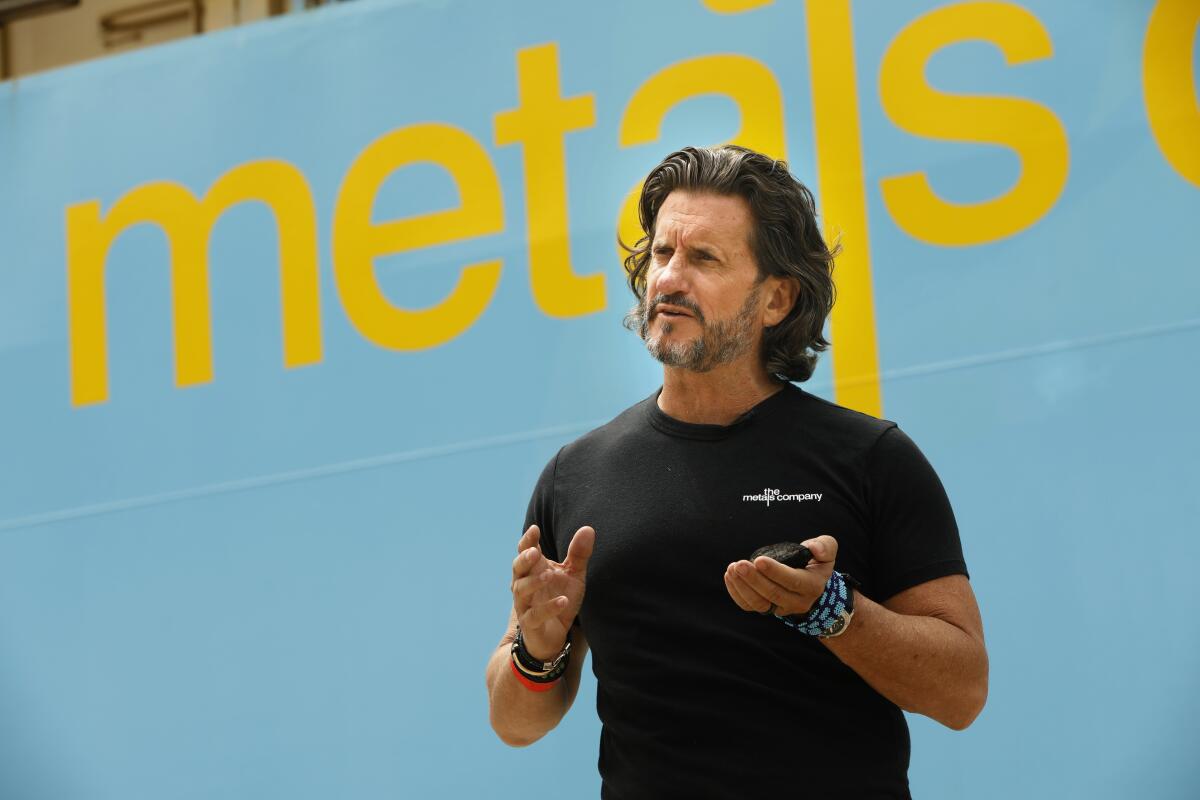
Environmentalists characterize such relationships as inappropriate.
“These revelations underscore the inherent conflicts of interest that have pervaded the International Seabed Authority and the need for a truly international oversight body to hold organizations like the ISA accountable,” said Kristina Gjerde, a senior high-seas advisor at the International Union for Conservation of Nature and a longtime ISA watchdog.
Officials at the Metals Co. say the authority is holding them to rigorous standards, and there is nothing inappropriate about the firm’s relationship with Lodge. A company statement said its officials never lobbied Lodge on regulations anywhere but in public ISA proceedings.
Barron’s email, the statement said, “was expressing a desire to support and assist the balancing of stakeholders as the ISA progressed towards the adoption of regulations.”
As for Lodge’s appearance in the company‘s 2018 video, which appears to have been removed from public view on its Vimeo page within the last year, the firm said he was one of many visitors to a ship it considers “an open platform for educating stakeholders.”
Fast-tracking regulations
The Metals Co. has not let the absence of mining regulations slow its quest. Soon after it assured investors last year that mining could begin in 2024, one of its sponsoring states, the tiny South Pacific island nation of Nauru, made a move that will help the company meet that aggressive timeline.
In June, Nauru, which is 8.1 square miles in size and has a population of fewer than 11,000, triggered a clause in the Law of the Sea that forces the ISA to fast-track regulations. The impoverished nation’s partnership with the mining company presents the prospect of a financial windfall.
If the authority doesn’t finish its rulemaking in a two-year time frame, it may be compelled to allow the Metals Co. to begin mining under whatever environmental standards are in place at that time, regardless of whether they are judged sufficient to protect ocean ecosystems.
The Metals Co.’s sway over Nauru was underscored at a February 2019 ISA Council meeting that DeepGreen chief Barron attended as part of the country’s official delegation. Nauru allowed Barron, an Australian, to sit in its delegate’s seat to address the council to pitch his company’s business plan and push seabed mining as a way to transition away from fossil fuels.
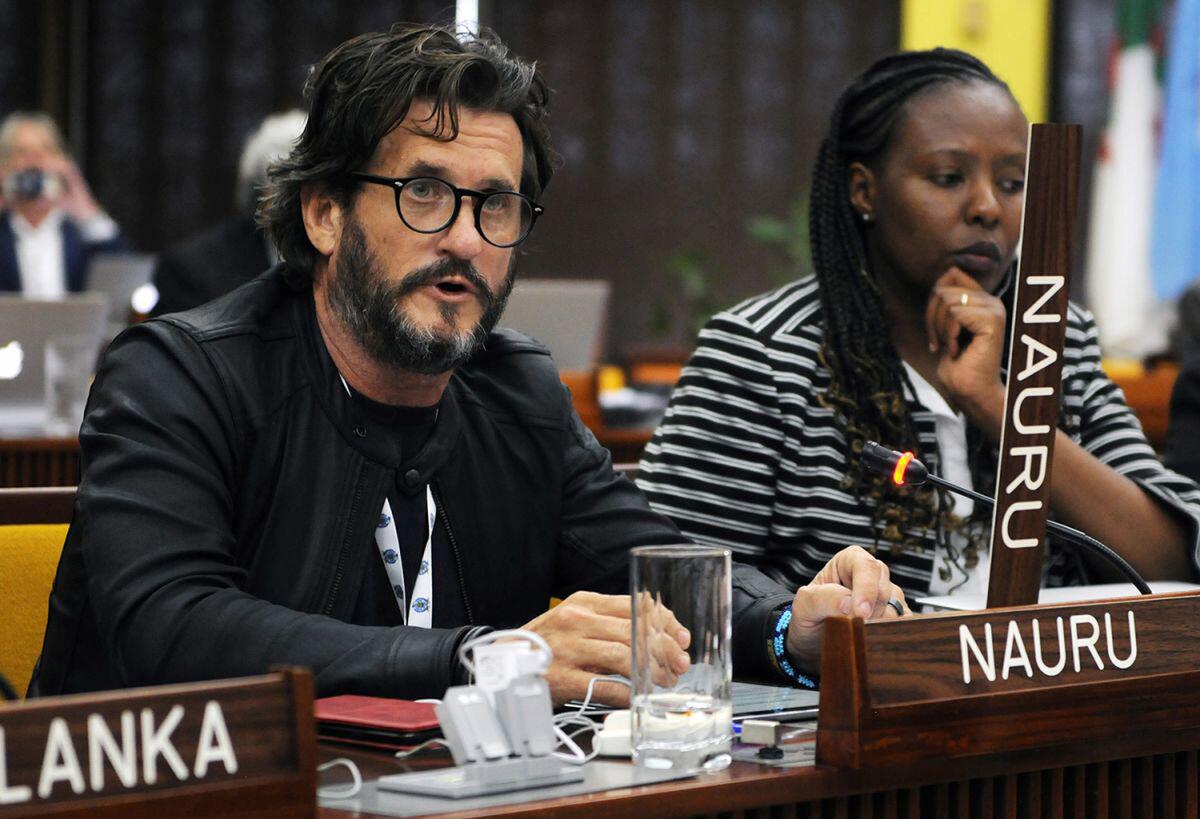
“We need to have confidence that the authority is acting in the interests of everyone and not just a handful of mining companies or individuals working for the secretariat,” said Matthew Gianni, a founder of the Deep Sea Conservation Coalition, an alliance of more than 90 environmental groups.
Changes at the ISA
Some inside the authority who questioned Lodge’s judgment find themselves no longer employed there.
Mulsow, who had raised concerns as a top environmental official at the ISA, said he was forced to retire at age 62. That was the official retirement age at the time, but the secretary-general had the ability to extend the age limit, according to authority staff regulations from 2017.
Around the same time, the secretariat reclassified chief scientific officer Bräger‘s position, and he left the ISA.
“I think that conservation is not of the highest priority of the current secretariat, and that was our job,” said Bräger.
The ISA, through its attorney, said the authority “cannot provide any further detail for reasons of confidentiality but can confirm that it acted properly and professionally and complied with all regulations and human resources procedures.”
A finance officer who repeatedly raised concerns about spending resigned after just 18 months in the position.
The authority’s financial controls have come under criticism. Three former staffers pointed to the fact that in 2017, budget oversight was contracted out to a Hong Kong company that produces protein from insects. While the company’s chief executive, a retired U.N. official, served as the temporary ISA budget and oversight officer, auditors hired by the authority identified “certain weaknesses” in internal control, including “improper accounting of transactions,” according to a July 2019 letter sent to the ISA‘s Finance Committee.
A lawyer representing the ISA said the authority’s Finance Committee is responsible for internal financial controls and pointed out that the committee is separate from the council and the secretariat. The lawyer also said the rules include an independent audit process.
The letter from the attorney said that “consistent with the auditor’s obligation, they did not find ‘any indication of fraud or irregularities.’ ” Ernst & Young, in a letter to the ISA Finance Committee that was reviewed by The Times, said the audit for 2018 was “not primarily directed towards the discovery of weaknesses, the detection of fraud or other irregularities,” but added that “we have not found any indications of fraud or irregularities this year.”
The ISA, through its attorney, said, “The auditors, as is usual practice, made a number of recommendations in respect of matters which were largely the result of a transition, in common with other organizations at the time, to the International Public Sector Accounting Standards (IPSAS) which required a progressive adoption of new accounting standards.”
A former ISA official who asked not to be named for fear of retaliation said a lack of financial oversight at the authority invited the potential for abuse.
“The ISA needs to be audited by the U.N. Board of Auditors or Joint Inspection Unit, and not by private firms hired by the ISA Secretariat,” the person said.
Closer financial oversight is especially important, legal experts say, as the International Seabed Authority creates its own mining venture through the Enterprise.
“It is concerning,” said Pradeep Singh, an ocean governance scholar at the University of Bremen in Germany. “You don’t have any other international organization that issues contracts saying, ‘You can mine here and make a lot of money.’”
More to Read
Get the L.A. Times Politics newsletter
Deeply reported insights into legislation, politics and policy from Sacramento, Washington and beyond. In your inbox three times per week.
You may occasionally receive promotional content from the Los Angeles Times.
